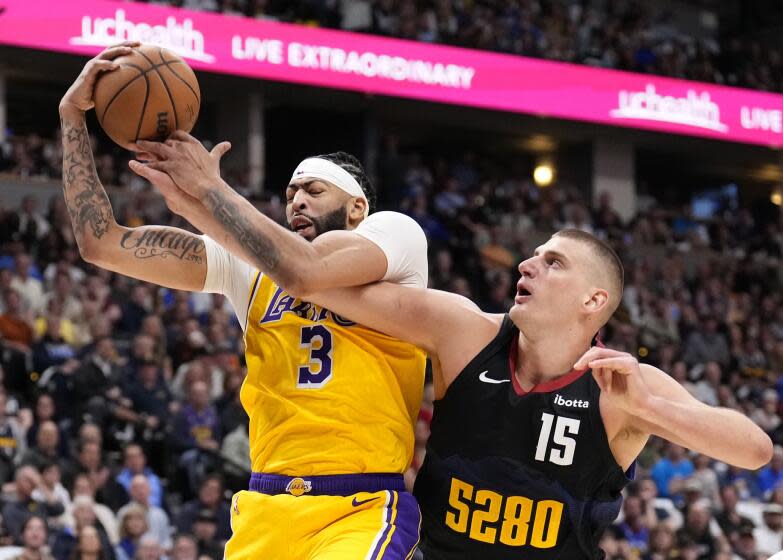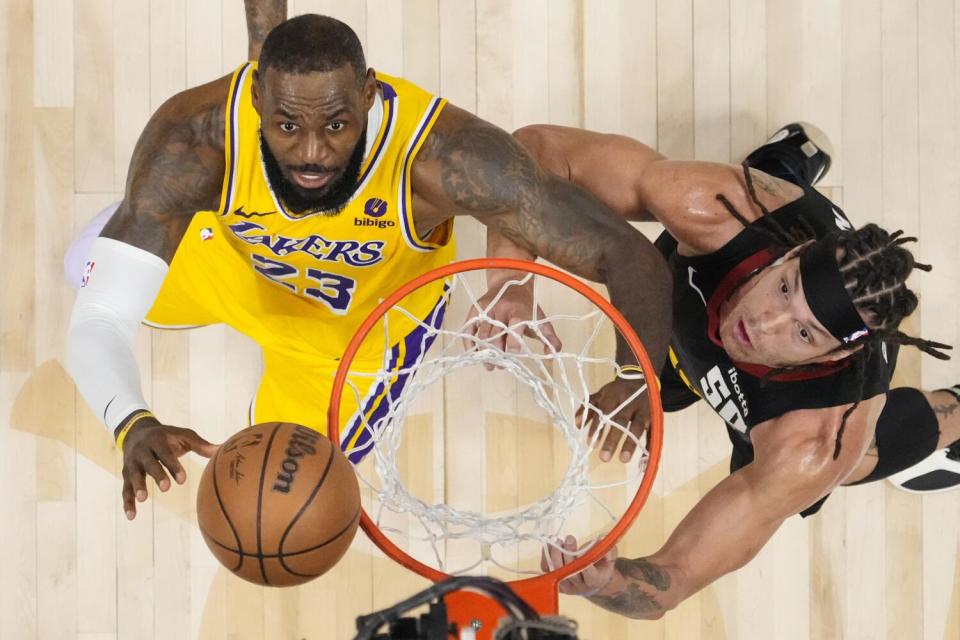Lakers are searching for the right adjustments and when to make them

United States
Breaking News:
5 arguably hilarious cartoons about the 2024 presidential debate
Lil Nas X: ‘Who do I most admire and why? I have to say myself’
Rubbish music, chatbots and online queues: welcome to your life lived on hold | Elle Hunt
Books for a better world: as chosen by Lenny Henry, Geri Halliwell-Horner, Andrew O’Hagan and others
Washington DC
Saturday, May 18, 2024


As the Lakers were rolling through the final third of the NBA season, their identity complete with Rui Hachimura in the starting lineup and their offense humming, a trend was quietly developing.
The Lakers, over those 32 games with Hachimura cemented as a starter, were the second-best offense in the NBA in the first half, scoring 121.8 points per 100 possessions.
In those second halves of those game? The rating dropped to 114.9 points per 100 possessions — sixth best.
Still good — but not as good as in the first half.
Through two games in the playoffs, the differences are even more stark.
In the first halves of Game 1 and 2, the Lakers have been right at their regular-season efficiency — 121.4 points per 100 possessions. But after Denver has made its second-half adjustments, the numbers have cratered.
Read more: Lakers lose to Nuggets in Game 2 heartbreaker on Jamal Murray buzzer-beater
In 48 second-half minutes in this series, the Lakers have scored only 92.2 points per 100 possessions while allowing Denver’s offense to be the most efficient in the postseason, scoring 129.5 per 100.
It’s the difference between the Lakers having an edge in the series and the 2-0 hole they’re facing ahead of Game 3 on Thursday.
Coach Darvin Ham said the team’s film session Wednesday illuminated the side of the court where the Lakers have struggled — on offense — when he’s seen his team inexplicably hit the brakes.
“We talk about maintaining our pace. And not just running up and down fast, throwing up quick shots,” Ham said. “It’s just doing things with a sense of urgency, whether it’s full court and being disciplined with our running habits or in the half court, creating an advantage with our separation, running into a pick-and-roll situation, actually getting a hit. And whoever is handling the ball, really putting pressure on the paint to score or make the pass.”
The Nuggets, who had the eighth-ranked defense in the regular season, flipped their coverages in the second half Monday in Game 2, moving Nikola Jokic off of Anthony Davis and using Aaron Gordon on him. Davis scored just two points after the switch — one made basket in the final 22 minutes of action.
Ham said it’s a fine line between making sweeping in-game adjustments and sticking with the game plan that helped work so well in those first halves.
“You have to be careful. You have to understand why you failed at something,” Ham said. “It’s not just, ‘we failed, let’s scrap the whole plan and go this way.’ No. You have to understand why things went the way they went.
Read more: Lakers takeaways: What more can LeBron James do? Was the officiating off?
“That’s the great thing about film. it reveals, once you settle down and get the emotions out, postgame emotions and you’re able to make an intelligent decision on whether to stay the course or change things completely. It’s never totally one or the other. It’s a little bit of both.”
After the game, Davis said there were times Monday when the Lakers “have stretches where we just don’t know what we’re doing on both ends of the floor.”
While Davis didn’t speak to the media after practice Wednesday, Ham said he thought those comments were born out of frustration.
“I just think sometimes when plays don’t turn out the way you think they should, then the frustration sets in a little bit. But I don’t think it’s [from] us not being organized,” Ham said. “I think I have incredibly talented coaches all along my staff. We pride ourselves, whether it’s a practice, a shoot-around, a film session, a game or whatever, we pride ourselves on being highly efficient and organized.
“I just chalk that up to being frustrated. It’s an emotional game, the way it ended and all of that. But I’ll agree to disagree on that one.”
LeBron James, who did have a good offensive finish to Game 2, said the Lakers have workshopped more than just a Plan A, that in-game adjustments have to be planned beforehand.
“I mean, it’s all part of the game. You got to be able to make adjustments on the fly but you also got to go in with a game plan,” James said. “You don’t go into a war with no game plan saying, ‘Oh, we’re going to make adjustments on the fly.’ And then now everybody’s ambushed.”

The Lakers have a plan, James said.
“We know some of the things that we can do better,” he said. “But you … there’s only so much we can talk about. We got to go out and be about it too.”
The good news, the Lakers said, is that they feel as if they’ve committed a lot of correctable mistakes in their first two losses to the Nuggets.
“Any time you lose, it’s tough, but at the end of the day, they held serve on their home floor and we’ve got to try to do the same,” Ham said. “And the film session was very revealing with which side of the ball we struggled at. We were great defensively. Offensively, there was a lot of shots we wish we could have back. We missed a lot of point-blank layups. But the way we defended, we really defended at a high level. We just got to continue that.”
The message shared throughout Wednesday’s media session was one of preparedness, the Lakers ready for the challenges they have in front of them.
“It’s all about sustainability,” James said. “It doesn’t matter what you can do throughout the first 47½ minutes. You got to close the game, which we didn’t do. We got to do a better job of that. But some of the things that we’ve done over the first couple games, we’re very excited and happy about those. But we got to do a better job of closing it.”
Sign up for our weekly newsletter on all things Lakers.
This story originally appeared in Los Angeles Times.